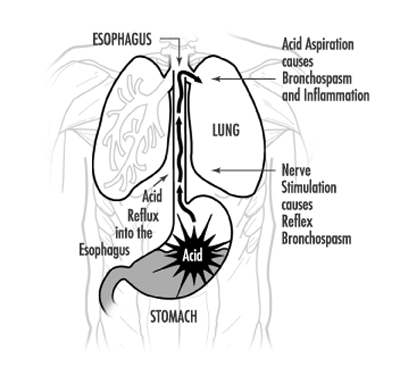Gastroesophageal Reflux Disease
Gastroesophageal Reflux Disease (GERD) is the backward flow of acid from the stomach into the esophagus (food tube connecting the mouth to the stomach).

Symptoms and Triggers
GERD is most likely to occur at night while lying down in bed or soon after eating. Local irritation in the esophagus can cause symptoms that vary from indigestion-like chest discomfort (heartburn) and abdominal pain to coughing and wheezing. If the gastric acid reaches the back of the throat, it may cause a bitter taste in the mouth and/or aspiration of the gastric acid into the lungs. The acid can cause throat irritation, post nasal drip and hoarseness as well as recurrent cough, chest congestion and lung inflammation leading to asthma and/or bronchitis/pneumonia. GERD can cause respiratory symptoms in two ways:
- By irritating sensitive asthmatic airways following inhalation of even tiny amounts of stomach acid and/or
- By nerve stimulation of the vagus nerve in the wall of the esophagus directly triggering bronchospasm (airway muscle contraction)
Factors that increase the chance of GERD:
- Ingestion of certain foods and beverages, large evening meals and bedtime snacks—particularly alcoholic beverages, peppermint, tobacco and caffeine stimulate the production of stomach acid
- Excess body weight increases the chance that the valve between the esophagus and stomach will leak stomach acid contents
- Tight clothes about the waist put pressure on the stomach and can promote reflux during daytime hours
- Decreased gastrointestinal motility (i.e. movement of food in the bowels) and constipation
Treatment
There are a number of simple measures you can perform to reduce or eliminate symptoms of GERD. Medications can also help, but they are not as effective without the following simple measures:
- Eat small meals.
- Wear loose or properly fitted clothing.
- Avoid caffeine (cola drinks, coffee and tea), chocolate, alcohol and peppermint.
- Use 2 tablespoons of a high potency liquid antacid (e.g. Maalox®) alone or with the use of an H2 blocker or proton pump inhibitor 1 hour before or 2 hours after meals and at bedtime for troublesome symptoms of heartburn and indigestion.
H2 Blockers and Proton Pump Inhibitors (PPI)
| H2 Blockers |
Proton Pump Inhibitors (PPI) |
| Axid® (nizatidine) |
Aciphex® (rabeprazole) |
| Pepcid® (famotidine) |
Nexium® (esomeprazole) |
| Tagamet® (cimetidine) |
Prevacid® (lansoprazole) |
| Zantac® (ranitidine) |
Prilosec® (omeprazole) |
| |
Protonix® (pantoprazole) |
- Raise the head of the bed 6 - 8 inches by inserting 2 - 3 bricks or a single block under each front bedpost. Do not leave the bed flat or use pillows to elevate your head and back. Pillows are not effective because they raise only the head and neck rather than the chest, and this position tends to place pressure on the contents of the stomach at the waist.
- Remain upright at least 2 hours after eating.
- Lose excess body weight.
- Avoid constipation by drinking fluids, increasing dietary fiber and participating in regular exercise.
- Stop smoking.
- Avoid aspirin and aspirin-like medications.
Certain medications may cause gastrointestinal upset and may worsen heartburn symptoms. Among these are two medications which are commonly used for the treatment of asthma: oral corticosteroids (prednisone and Medrol®) and theophylline (Theo-24®, Uniphyl® and others). Your asthma specialists should take into consideration the presence of GERD when prescribing asthma medications. Blood levels of theophylline are closely followed as elevated theophylline levels in the blood are associated with more frequent occurrences of nausea, stomach upset and vomiting.
After careful individual consideration of your symptoms, your physicians may determine that your condition requires the use of theophylline and/or oral corticosteroids to more effectively control your breathing problem. In addition, your physician may use medications to reduce or prevent the production of stomach acid (H2 blocker or proton pump inhibitor), especially when using theophyllines and oral corticosteroids. In extreme cases of GERD that do not respond to medications, surgical procedures may be an alternative treatment.